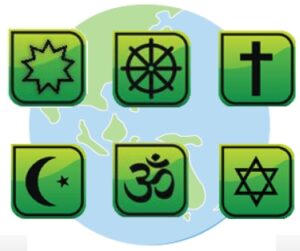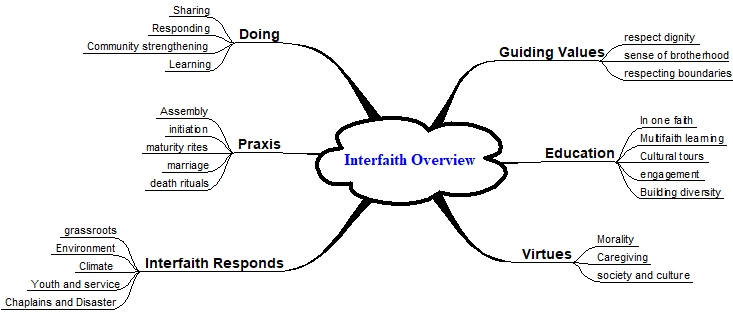
Interfaith activity comprises of neighbourhood connections where faith communities and their leaders are known to each other and – possibly – have visited one another’s places of worship. Grassroots interfaith activity is where believers of different faiths come together to build harmony, cooperation and understanding. This can happen at the neighbourhood level, at the state level, or at a national level. There is also interfaith activity in community disasters and emergencies, where faith leaders serve as chaplains in emergency relief centres, and in disaster response.
Other forms of interfaith activity takes up spiritual health in common, providing spiritual care in acute care environments such as hospitals, hospices and homes for the aged.
Tours of Places of Worship
These are sometimes labelled cultural tours. Organised tours of places of worship can introduce the sacred architecture of the house of worship, sacred objects, the worship service, the holy scriptures and other sacred books. The participation of faith leaders is often necessary to ensure that the visitors receive the correct information. Sometimes, there is a need for translators, etc. Beyond place of worship, there can be a telling of the community service taken up by the faith community – for its own congregation, and the community at large, e.g., provision of food, clothing, etc.
Interfaith Responses in times of Crisis
Grassroots interfaith activity builds a network of connections between faith leaders and provides the ability to mobilise faith community responses quickly. It may also build networks of connections between youth of faith groups and their ability to bond and work together effectively in crisis.
Examples of responses are,
- Online Seminar Series Faith Perspectives on the Pursuit of Happiness – reaching beyond ourselves
- Climate change and the Environment: Living the Change webinars, Season of Creation campaign
- Isolation thought art project – an artwork created through contributions from different faiths and cultures.
- South Australia Multifaith event: Interfaith Prayers for Bushfire Recovery and Resilience
- Interfaith Prayer Vigil for Healing the Earth
- Australian Religious Response to Climate Change Multifaith service for the climate
Engaging Young People:
Young people are tolerant of differences and open to exploration and discovery of their worlds. It is a sign of self-confidence and resilience when they open their minds to different understandings of the world, its origins and different faith traditions. In order to engage young people, several options can be considered, as there are more options for designing, participating and leading segments of an interfaith service. This can lead to,
- Setting Retreat topics that are relevant, engaging
- Opportunities to lead the worship service or parts of the worship activity
- Leading of chanting and meditation
- Opportunities for public speaking
- group discussions in breakout sessions
Activity Options
In designing activities for participation to build harmony, cooperation and understanding of different faiths, we need to attend to people who come from many different environments and backgrounds. Sitting people in pews and lecturing to them is not the only way (nor the best way) to give people an appreciation of faith and the differences between faiths. Useful and informative activities might be, among others,
- Forum/seminar
- Panel discussion
- Tour of places of worship or places of cultural significance
- Art session or project
- Training/ Workshop with group activities
- Film/Documentary Screening
- Community Conversation (Virtual or otherwise)
- Shared meal
- Concert/ Festival
Respecting Boundaries, Respecting Difference:
An important consideration for interfaith activity of any kind is respect.
The first dimension of respect is respecting the boundaries and sensibilities of people of another faith. Interfaith activity never seeks to recruit, evangelise, transform nor collect new adherents for one’s own faith. The boundaries of the faith of other people are always respected, and the teachings explained are not reduced to one’s own religion, nor are they dismissed out of hand. We always respect the boundaries of another religion as a complete, a whole personal and culturally binding faith system which cares for its adherents from birth to death, and beyond.
Respect for Boundaries is a most important foundation of interfaith encounter.
Respect for Boundaries also includes respecting the religiosity and beliefs of the faith community in your encounter. Where a faith community has certain beliefs and dogmas, if these are new, and outside of your experience or comprehension (or your belief), you are obliged to respect the sensibilities of those who are offering you hospitality. Hospitality – offered to you, the stranger – grants you dignity, respect and honour. It is your task to see that you honour what is given, you honour the giver, and return that honour with your respect, your dignity, your own capacity for honour. You take care not to offend, you take care not to commit sacrilege, you take care to respect the hospitality that is offered to yourself.
You may wish to recognise that you hold certain values in common with members of other religions, other beliefs.
Engagement with Life
There are many activities we take up in common in the work-a-day world we live in. We sleep, we rise and break the fast of the night, we wash and attend our workplace (or our places of learning), we come home to family afterwards. We deem some things important to all, such as activities we enjoy doing, the values we practice that are for the good of all, and the things that make life better for all.
- Health and Wellbeing
- Music
- Art
- ensuring that all in our community have access to nourishing food
- Prevention of violence, especially in families
- ensuring the welfare of children
- Respecting Diversity
- Equality and the elimination of racism
- Culture, its artefacts and appreciation
- Awareness of Indigenous peoples and their rights
- Climate change and the environment
- Homelessness and the need for social housing
There are many matters of concern to us all in our home, in our schools, in our neighbourhood, in our society and the nation. Although we are people of different faiths (and none), we recognise spiritual truths together and the need for human dignity, human values and human rights. We recognise the Brotherhood of man, and the Fatherhood of God.
![]()


